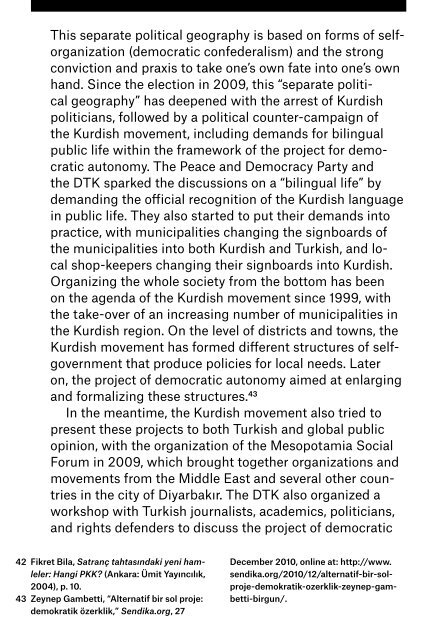Stateless Democracy
NWA5-Stateless-Democracy
NWA5-Stateless-Democracy
Create successful ePaper yourself
Turn your PDF publications into a flip-book with our unique Google optimized e-Paper software.
This separate political geography is based on forms of selforganization<br />
(democratic confederalism) and the strong<br />
conviction and praxis to take one’s own fate into one’s own<br />
hand. Since the election in 2009, this “separate political<br />
geography” has deepened with the arrest of Kurdish<br />
politicians, followed by a political counter-campaign of<br />
the Kurdish movement, including demands for bilingual<br />
public life within the framework of the project for democratic<br />
autonomy. The Peace and <strong>Democracy</strong> Party and<br />
the DTK sparked the discussions on a “bilingual life” by<br />
demanding the official recognition of the Kurdish language<br />
in public life. They also started to put their demands into<br />
practice, with municipalities changing the signboards of<br />
the municipalities into both Kurdish and Turkish, and local<br />
shop-keepers changing their signboards into Kurdish.<br />
Organizing the whole society from the bottom has been<br />
on the agenda of the Kurdish movement since 1999, with<br />
the take-over of an increasing number of municipalities in<br />
the Kurdish region. On the level of districts and towns, the<br />
Kurdish movement has formed different structures of selfgovernment<br />
that produce policies for local needs. Later<br />
on, the project of democratic autonomy aimed at enlarging<br />
and formalizing these structures. 43<br />
In the meantime, the Kurdish movement also tried to<br />
present these projects to both Turkish and global public<br />
opinion, with the organization of the Mesopotamia Social<br />
Forum in 2009, which brought together organizations and<br />
movements from the Middle East and several other countries<br />
in the city of Diyarbakır. The DTK also organized a<br />
workshop with Turkish journalists, academics, politicians,<br />
and rights defenders to discuss the project of democratic<br />
42 Fikret Bila, Satranç tahtasındaki yeni hamleler:<br />
Hangi PKK? (Ankara: Ümit Yayıncılık,<br />
2004), p. 10.<br />
43 Zeynep Gambetti, “Alternatif bir sol proje:<br />
demokratik özerklik,” Sendika.org, 27<br />
December 2010, online at: http://www.<br />
sendika.org/2010/12/alternatif-bir-solproje-demokratik-ozerklik-zeynep-gambetti-birgun/.<br />
autonomy in 2010. The organization of all segments of<br />
society from the bottom-up, under the principle of democratic<br />
confederalism and democratic autonomy, has been<br />
covering very different fields of social life and requires<br />
various activities. All these activities demonstrate that the<br />
PKK’s project of radical democracy involves an active agency<br />
of people, in the form of a struggling force from the local<br />
to the regional and global levels. Even more importantly,<br />
they show that this is a project that is based on bottom-up<br />
democracy, and therefore cannot simply be considered a<br />
political project imposed from above. Through communes<br />
and people’s assemblies, it aims to surpass the deadlock of<br />
representational democracy. In this sense, the democratic<br />
autonomy project in the form of 26 autonomous regions<br />
as formulated by the Kurdish movement presents a radical<br />
alternative that goes beyond the boundaries of the existing<br />
political regime. Above all, it is based on a radical conception<br />
of democracy — one that aims at the dissociation of<br />
democracy from nationalism by excluding state and nation<br />
from it and considering democracy as an unrestricted and<br />
unmediated form of people’s sovereignty rather than a form<br />
of government. As such, this project for democratic autonomy<br />
goes beyond the boundaries of the existing political<br />
regime as well the framework elaborated on the basis<br />
of the European Union’s acquis communautaire, which uses<br />
liberal democracy as its benchmark, although there is an<br />
ongoing discussion as to whether this proposal might suit<br />
the EU regional policy, given that it could be a useful step<br />
towards a solution of the Kurdish question by abolishing<br />
the centralism in Turkey. 44<br />
The Kurdish movement is ready to negotiate a solution<br />
on the basis of recognition and self-administrative rights.<br />
44 Erhan Üstündağ, “Possible Solution for<br />
Kurdish Question suits EU Accession Process,”<br />
Bianet, 1 July 2010, online at: http://<br />
www.bianet.org/english/english/123087-<br />
possible-solution-for-kurdish-questionsuits-eu-accession-process.<br />
186–187


